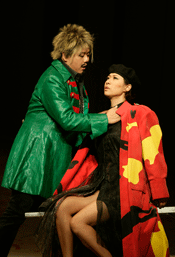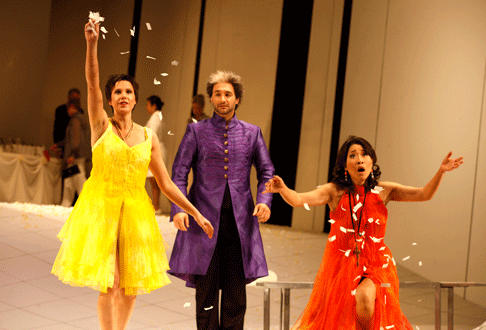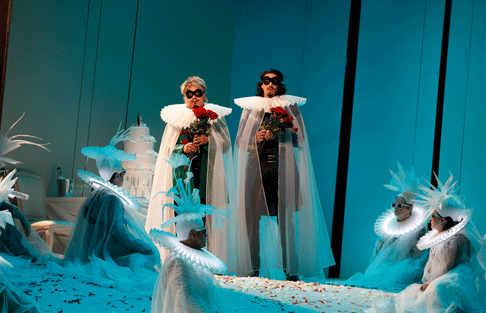![Sian Pendry (Dorabella) and Luke Gabbedy (Guglielmo) [Photo by Jeff Busby courtesy of Opera Australia]](http://www.operatoday.com/Cosi_OA_01.gif)
24 Nov 2009
Così fan tutte, Opera Australia
Like most opera companies, the Mozart/da Ponte trifecta of Figaro, Don Giovanni and Così fan tutte are central to Opera Australia’s repertoire.
English Touring Opera are delighted to announce a season of lyric monodramas to tour nationally from October to December. The season features music for solo singer and piano by Argento, Britten, Tippett and Shostakovich with a bold and inventive approach to making opera during social distancing.
This tenth of ten Live from London concerts was in fact a recorded live performance from California. It was no less enjoyable for that, and it was also uplifting to learn that this wasn’t in fact the ‘last’ LfL event that we will be able to enjoy, courtesy of VOCES8 and their fellow vocal ensembles (more below …).
Ever since Wigmore Hall announced their superb series of autumn concerts, all streamed live and available free of charge, I’d been looking forward to this song recital by Ian Bostridge and Imogen Cooper.
The Sixteen continues its exploration of Henry Purcell’s Welcome Songs for Charles II. As with Robert King’s pioneering Purcell series begun over thirty years ago for Hyperion, Harry Christophers is recording two Welcome Songs per disc.
Although Stile Antico’s programme article for their Live from London recital introduced their selection from the many treasures of the English Renaissance in the context of the theological debates and upheavals of the Tudor and Elizabethan years, their performance was more evocative of private chamber music than of public liturgy.
In February this year, Albanian soprano Ermonela Jaho made a highly lauded debut recital at Wigmore Hall - a concert which both celebrated Opera Rara’s 50th anniversary and honoured the career of the Italian soprano Rosina Storchio (1872-1945), the star of verismo who created the title roles in Leoncavallo’s La bohème and Zazà, Mascagni’s Lodoletta and Puccini’s Madama Butterfly.
Evidently, face masks don’t stifle appreciative “Bravo!”s. And, reducing audience numbers doesn’t lower the volume of such acclamations. For, the audience at Wigmore Hall gave soprano Elizabeth Llewellyn and pianist Simon Lepper a greatly deserved warm reception and hearty response following this lunchtime recital of late-Romantic song.
Collapsology. Or, perhaps we should use the French word ‘Collapsologie’ because this is a transdisciplinary idea pretty much advocated by a series of French theorists - and apparently, mostly French theorists. It in essence focuses on the imminent collapse of modern society and all its layers - a series of escalating crises on a global scale: environmental, economic, geopolitical, governmental; the list is extensive.
For this week’s Live from London vocal recital we moved from the home of VOCES8, St Anne and St Agnes in the City of London, to Kings Place, where The Sixteen - who have been associate artists at the venue for some time - presented a programme of music and words bound together by the theme of ‘reflection’.
'Such is your divine Disposation that both you excellently understand, and royally entertaine the Exercise of Musicke.’
Amongst an avalanche of new Mahler recordings appearing at the moment (Das Lied von der Erde seems to be the most favoured, with three) this 1991 Mahler Second from the 2nd Kassel MahlerFest is one of the more interesting releases.
‘And there was war in heaven: Michael and his angels fought against the dragon; and the dragon fought and his angels, And prevailed not; neither was their place found any more in heaven … that old serpent … Satan, which deceiveth the whole world: he was cast out into the earth, and his angels were cast out with him.’
If there is one myth, it seems believed by some people today, that probably needs shattering it is that post-war recordings or performances of Wagner operas were always of exceptional quality. This 1949 Hamburg Tristan und Isolde is one of those recordings - though quite who is to blame for its many problems takes quite some unearthing.
There was never any doubt that the fifth of the twelve Met Stars Live in Concert broadcasts was going to be a palpably intense and vivid event, as well as a musically stunning and theatrically enervating experience.
‘Love’ was the theme for this Live from London performance by Apollo5. Given the complexity and diversity of that human emotion, and Apollo5’s reputation for versatility and diverse repertoire, ranging from Renaissance choral music to jazz, from contemporary classical works to popular song, it was no surprise that their programme spanned 500 years and several musical styles.
The Academy of St Martin in the Fields have titled their autumn series of eight concerts - which are taking place at 5pm and 7.30pm on two Saturdays each month at their home venue in Trafalgar Square, and being filmed for streaming the following Thursday - ‘re:connect’.
The London Symphony Orchestra opened their Autumn 2020 season with a homage to Oliver Knussen, who died at the age of 66 in July 2018. The programme traced a national musical lineage through the twentieth century, from Britten to Knussen, on to Mark-Anthony Turnage, and entwining the LSO and Rattle too.
With the Live from London digital vocal festival entering the second half of the series, the festival’s host, VOCES8, returned to their home at St Annes and St Agnes in the City of London to present a sequence of ‘Choral Dances’ - vocal music inspired by dance, embracing diverse genres from the Renaissance madrigal to swing jazz.
Just a few unison string wriggles from the opening of Mozart’s overture to Le nozze di Figaro are enough to make any opera-lover perch on the edge of their seat, in excited anticipation of the drama in music to come, so there could be no other curtain-raiser for this Gala Concert at the Royal Opera House, the latest instalment from ‘their House’ to ‘our houses’.
"Before the ending of the day, creator of all things, we pray that, with your accustomed mercy, you may watch over us."
![Sian Pendry (Dorabella) and Luke Gabbedy (Guglielmo) [Photo by Jeff Busby courtesy of Opera Australia]](http://www.operatoday.com/Cosi_OA_01.gif)
Like most opera companies, the Mozart/da Ponte trifecta of Figaro, Don Giovanni and Così fan tutte are central to Opera Australia’s repertoire.
Like his production of Don Giovanni, the staging of Così fan tutte by the late Göran Järvefelt served the company well for decades before being replaced in September by this new take on the story by Jim Sharman. Sharman is one of Australia’s most invigorating stage directors whose earliest work was with Opera Australia (then called The Australian Opera) when, in 1967, as a twenty-one year old, he produced Don Giovanni, setting it on a huge chess board and calculating the Don’s progress to Hell like chess strategies. Sharman’s biggest claim to worldwide fame, however, is as director of the original The Rocky Horror Show and it’s subsequent film adaptation. In Australia he now counted among the country’s foremost directors with laudable stagings of classic and contemporary plays, musicals and occasionally operas. His staging of Britten’s Death in Venice was mounted for the 1980 Adelaide Festival, barely five after it’s premiere where it garnered favourable comments from local and international critics before being taken into Opera Australia’s repertoire where it still holds sway nearly thirty years later.
Like than early Don Giovanni, Sharman’s Così fan tutte sadly seems to be trying too hard. But by most accounts Così is a difficult opera to pull off. The partner swapping shenanigans and misogynist sentiment have stranded it as a kind of antiquated boulevard farce like Georges Feydeau set to music!
 Henry Choo (Ferrando) and Hye Seoung Kwon (Fiordiligi)
Henry Choo (Ferrando) and Hye Seoung Kwon (Fiordiligi)
Using a contemporary setting, Sharman reveals during the overture a wedding
party, the couple, a Japanese Bride and Groom, arriving at the reception before
freezing the action and transporting the Bride and Groom to either side of the
stage where they watch the opera unfold before being transported back at the
end of the opera to their nuptials as the cast sing the opera’s moral.
Don Alfonso’s (José Carbó) bet appears to be a the result of a locker
room brag as Ferrando (Henry Choo) and Guglielmo (Luke Gabbedy), under stylised
showers, compare their respective fiancée’s virtue (rather, as one would
imagine in a locker room situation, their physical or sexual attributes). The
action unfolds in a white walled set, designed by Ralph Myers, with an arched
floor where the stranded wedding organisers and guests act as chorus and
occasional prop movers. Occasionally the wedding photographer appears with a
live video camera to zoom in on characters during their principal arias and
relay their image to a huge curtain interminably pulled back and forth
throughout the long opera.
While the concept may be puzzling it works well enough until the second act where these directorial high jinks gloss over the searing bitterness as Fiordiligi (Hye Seoung Kwon) agonises over her situation and the two men agonise over the swiftness of their lovers infidelity. Unlike Brad and Janet in Sharman’s notorious The Rocky Horror Show, the partner swapping and sexual humiliation is far from funny. In fairness the fault lies with the opera itself it’s sexual attitudes are as infuriating to modern audiences as those of Shakespeare’s The Taming of the Shrew and even the best directors have a tough job with either.
 Sian Pendry (Dorabella), José Carbó (Don Alfonso) and Hye Seoung Kwon (Fiordiligi)
Sian Pendry (Dorabella), José Carbó (Don Alfonso) and Hye Seoung Kwon (Fiordiligi)
The opera is also sung in a modern English translation by Jeremy Sams that almost matches the famous, mid-twentieth century, Ruth and Thomas Martin translation for its lumpiness. While getting plenty of laughs for its up to date casualness (“I might forget myself or even wet myself” sing the men after Guglielmo’s ‘mustacchi’ serenade sends the ladies packing), Sams’s choice of words robs the open-vowelled flow of da Ponte’s Italian text. Nor does Sams even try to be literal about translating the original words, let along consider their singability “I have sinned my best beloved” is his substitution for Fiordiligi’s “per pieta, ben mio perdona”. Sams even suggests that the opera's ‘motif’’ “Così fan tutte”, when sung by Don Alfonso should be “That’s how God made them”. If an opera company must perform a work in translation (and spend good money on royalties for it) it should at least be better than this.
To their credit, the young cast sing even the most difficult passages clearly; nearly every word of the unfortunate text is audible. Henry Choo is a most stylish tenor; his voice has the heft to carry into the big auditorium without apparent force. He establishes a beautiful and limpid line through ‘Un’aura amorosa’ and is spot-on in the difficult runs in the act one finale. As Guglielmo, Luke Gabbedy’s light baritone could almost be mistaken for a tenor and a darker colour might be wished for in the duet with Dorabella (Sian Pendry) and the act two aria. The same applies to José Carbó’s as Alfonso, the voice seeming lighter than one would expect for the role. Of the ladies the most accomplished is Tiffany Speight as Despina. Speight is one of the company’s best Mozartians, her voice is silvery, carries effortlessly and her charming stage presence carries with the same clarity. Hye Seong Kwon handled Fiordiligi’s big moments with breathtaking ease, long phrases, octave jumps and embellishments all perfectly judged despite the impositions the English words placed on her. Sian Pendry handled Dorabella’s music with similar ease; hers is a high, light mezzo, rather like Gabbedy’s high, light baritone. Kwon and Pendry also make their first appearance in swim suits and spend the rest of the opera equally revealing costumes and both have catwalk figures.
 Henry Choo (Ferrando) and Luke Gabbedy (Guglielmo)
Henry Choo (Ferrando) and Luke Gabbedy (Guglielmo)
Ollivier-Philippe Cunéo coaxed a period sounding performance from the orchestra, the strings occasionally emphasising that wiry sound that passes for authentic. Cunéo also adopts that peculiar practice of breathlessly playing the two opening chords of the overture (as evidenced in Arnold Östman's 1986 recording of the opera) and generally rushing things where a little restraint might have been better. The woodwind were often given a difficult time and the big moment when Fiordiligi finally succumbs (Mozart’s delectably sudden change from lurching chords to gorgeous runs on the strings) passed without the attention it deserves.
With chick costumes and attractive singers to wear them, this Così will certainly appeal to younger audiences. Sharman is obviously at his best when dealing amorous absurdities but the deeper musical and emotional content that is so unique in the Mozart/da Ponte operas are left buried.
Michael Magnusson